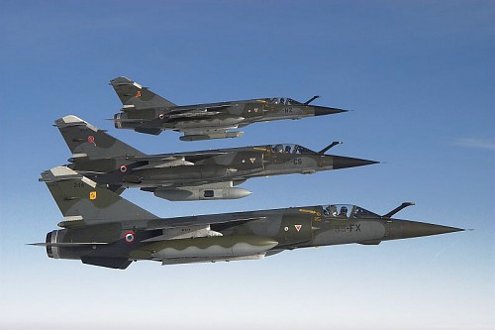
By Johannes Tropper, student of Law at the University of Vienna and ambassador to Austria for the European Student Think Tank.
The heinous attacks in Paris have shaken the whole of Europe. The French President described the attacks by ISIS terrorists as an ‘act of war’, which implied that a serious response had to be expected. However, France has already been involved in combating the terrorists in the Middle East by military means. This raises a central question: What has been the legal basis of French military strikes against ISIS under international law?
Since 2014 a coalition of the United States, France and other countries has flown airstrikes against ISIS in Iraq and Syria. In 2015 the Russian Federation got involved targeting ISIS and other groups in Syria. In response to the terrorist attacks in Paris, France has now declared war on ISIS. Under international law there is neither a general obligation nor a justification to take unilateral military action against terrorists requiring these parties to find other forms of legal justifications (see below).
Recently, the Security Council passed Resolution 2249, in which it ‘(c)alls upon Member States that have the capacity to do so to take all necessary measures (…) to prevent and suppress terrorist acts committed specifically by ISIL (…) and to eradicate the safe haven they have established over significant parts of Iraq and Syria’[i]. Interestingly, this resolution does neither refer to Chapter VII of the UN Charter (which inter alia sanctions the use of military measures to restore peace and stability), nor authorize all necessary measures, i.e. military force, but merely calls upon member states to do take measures. While it grants a certain degree of legitimacy to actions to the air strikes in Syria, it cannot safely be regarded as the actual legal basis. The ambiguity of Resolution 2249 gives a lot of leeway to states (EJIL:Talk! provides a good analysis of the resolution[ii]). Regardless, the resolution could not legitimize previous military strikes, leading to the question whether France and other countries have had a right to bomb ISIS facilities in Iraq and Syria.
What has then been the legal basis for the current and previous attacks? Was a right of self-defence invoked and if yes by whom and against which opponent?
In order to answer these questions, we first have to look at what self-defence actually is.
What is self-defence?
Self-defence is a prominent exception to the prohibition of the use of force in international relations. It is crucial to point out that it does not require authorization by the Security Council. Article 51 of the UN Charter states that ‘nothing in the present Charter shall impair the inherent right of individual or collective self-defence if an armed attack occurs against a Member of the United Nations (…)’[iii]. The right of self-defence is part of international customary law. In short, international customary law can be described as a product of state practice supported by the belief that the practice is obligatory under international law.
In order to resort to force as a measure of self-defence, an armed attack needs to be imminent, occurring or terminated. A certain threshold has to be crossed to refer to events as an armed attack. Terrorist attacks of a certain magnitude, in particular involving large number of casualties, can constitute an armed attack. Even the mining of a single military vessel was regarded as an armed attack by the International Court of Justice (ICJ).[iv] Moreover, jurisprudence highlights that armed attacks cannot only be instigated by regular armed forces but also irregular forces, i.e. militia and other groups, which are not members of the army or police.[v] Nonetheless, the ICJ still requires attribution of attacks by irregular forces to a state in order to invoke self-defence. This means that self-defence is only available against states or actors somehow linked to states. In recent cases the ICJ was reluctant to address the question of a right of self-defence against non-state actors without attribution to a state. Divergent opinions on the interpretation of said norm have emerged on the bench.[vi] Could state practice have fundamentally changed to extend the scope of the right of self-defence to cases of armed attacks by non-state actors (i.e. terrorists)?
Self-defence in the case of terrorism
Until the 1990s, the international community was rather dismissive of unilateral responses against terrorists on foreign soil without the involvement or approval of the affected state. Unilateral military action against terrorists abroad was almost always unanimously condemned by the members of the international community (with the exception of the US, Israel and South Africa during Apartheid, when ANC fighters abroad were targeted by South Africa). During the 90s, Cold War ideology played no longer a role in invoking self-defence against terrorists, but there was still no general support for a broad interpretation of self-defence by the Security Council.
Following 9/11, a gradual shift has taken place. From the point of view of an ever increasing number of states from all continents and regions, it should be legitimate to take action against terrorists’ bases in one country without approval of the government of said country under certain circumstances.[vii]
Arguably, an inevitable conflict of norms would emerge. On the one hand, there is the principle of non-intervention and the prohibition of the use of force against the territorial integrity. On the other hand states have an understandable interest to target terrorists abroad, who evade their jurisdiction and plan to cause substantial havoc.
States and several legal scholars argue that a right of self-defence against non-state actors should be available under certain conditions. According to the proponents of such a view, the necessary requirement for invoking self-defence against non-state actors is the inability or unwillingness of the host state to eliminate the terrorist threat.[viii] Apart from the ‘unable or unwilling’-test, the strict adherence to two pivotal tenets, namely necessity and proportionality, is indispensable. Recourse to force would need to be targeted, limited and in no manner excessive. To be in conformity with the law, it shall only serve as a last resort because it still infringes on the territorial integrity from which the terrorist threat emanates.
Legal justification for military strikes against ISIS
The attacks against ISIS in Iraq were solely based on a request for military assistance by the Iraqi government. A sovereign government is principally free to invite foreign troops to engage in military operations on its territory.[ix] Consequently, the air strikes in Iraq are legitimate.
The military strikes by the US and France in Syria, however, were not requested by the Syrian government. In the absence of expressive consent, the legal foundation must have been self-defence.
Self-defence was indeed invoked, but not by the US or France, but by Iraq. Hence, the US and France merely exercise the right of self-defence on behalf of Iraq in the form of collective defence.[x] As explained above, the international law on self-defence against non-state actors is elusive at best. The US cited the ‘unable- or unwilling’-test in order to justify the actions on behalf of Iraq in Syria.[xi] Whether previous actions by the US and France in Syria are regarded as legal or not, hinges on the question whether the ‘unwilling or unable’-test has been recognized. If this is really the case, self-defence against non-state actors is permissible even if the territorial integrity is not respected.
Should Iraq withdraw its request, the legal justification for the continuation of the attacks in Syria would previously have ceased to exist– that is if it ever actually existed. Under no circumstances could the US and France have combatted ISIS on the basis of a pre-emptive right of self-defence. As the law stands, there is no pre-emptive right of self-defence against anyone, i.e. self-defence against a potential future threat. However, following the attacks in Paris, French self-defence against ISIS in Syria is warranted provided that the ‘unwilling or unable’-formula is accepted.
Now, depending on how liberally Resolution 2249 is interpreted, it may serve as a further legal justification. Regardless, France could still attempt to claim self-defence against ISIS as an additional legal foundation in order to attract military support from its allies and consolidate the legality of its military campaign.
Conclusion
The military strikes against ISIS in Syria seem to have been a watershed moment in international customary law. Prior to the Resolution 2249 they were only legal under the assumption that the international customary right of self-defence encompassed actions against non-state actors premised on the ‘unwilling or unable’-test.
Since 9/11 and particularly following the events in Syria, significant developments with regards to right of self-defence can be witnessed. Albeit international jurisprudence has not caught up with these developments, consensus among the international community has been emerging that the right of self-defence should be expanded to include actions against terrorists. In any case, there is no doubt that the actions in Syria will be the precedent for future operations based on the right of self-defence against terrorism.
This piece expresses the opinions of the author only and does not necessarily reflect the position of the European Student Think Tank.
[i] UNSC Res 2249 (20 November 2015) UN Doc S/RES/2249
[ii] http://www.ejiltalk.org/the-constructive-ambiguity-of-the-security-councils-isis-resolution/
[iii]Charter of the United Nations (entered into force 24 October 1945) Article 51
[iv]Oil Platforms (Islamic Republic of Iran v. United States of America) (Merits) [2003] ICJ Rep 16, para 71
[v]Military and Paramilitary Activities in and against Nicaragua (Nicaragua v United States of America) (Merits) [1986] ICJ Rep 14, para 193
[vi]Trapp K, ‘Back to Basics: Necessity, Proportionality, and the Right of Self-Defence against Non-State Terrorist Actors’ (2007) 56 ICLQ 141
[vii]Tams C, ‘The Use of Force against Terrorists’ (2009) 20 EJIL 359
(http://www.ejil.org/pdfs/20/2/1793.pdf)
[viii] Daniel Bethlehem, ‘Principles Relevant to the Scope of a State’s Right of Self-defence against an Imminent or Actual Armed Attack by Non-State Actors’ (2012) 106 AJIL 770
(http://www.un.org/law/counsel/Bethlehem%20-%20Self-Defence%20Article.pdf)
[ix]http://www.ejiltalk.org/the-airstrikes-against-islamic-state-in-iraq-and-the-alleged-prohibition-on-military-assistance-to-governments-in-civil-wars/
[x]Letters from the Permanent Representative of France to the United Nations addressed to the Secretary -General and the President of the Security Council (9 September 2015) UN Doc S/2015/745
http://www.securitycouncilreport.org/atf/cf/%7B65BFCF9B-6D27-4E9C-8CD3-CF6E4FF96FF9%7D/s_2015_745.pdf
[xi]Letter from the Permanent Representative of the United States of America to the United Nations addressed to the Secretary-General (23 September 2014) UN Doc S/2014/695

 What Happened to the Polish Left? An Analysis of the Party’s Ideological Development and Changing Electoral Base
What Happened to the Polish Left? An Analysis of the Party’s Ideological Development and Changing Electoral Base  Struggle for Conservation of Slovenian Minorities in Austria, Italy and Hungary: Why does Multilateral Action Matter?
Struggle for Conservation of Slovenian Minorities in Austria, Italy and Hungary: Why does Multilateral Action Matter?  The Nature Restoration Law: A Significant Milestone or An Example of the EU Green Deal Losing Momentum?
The Nature Restoration Law: A Significant Milestone or An Example of the EU Green Deal Losing Momentum?  The Role of Women in Peacebuilding and Conflict Transformation
The Role of Women in Peacebuilding and Conflict Transformation 